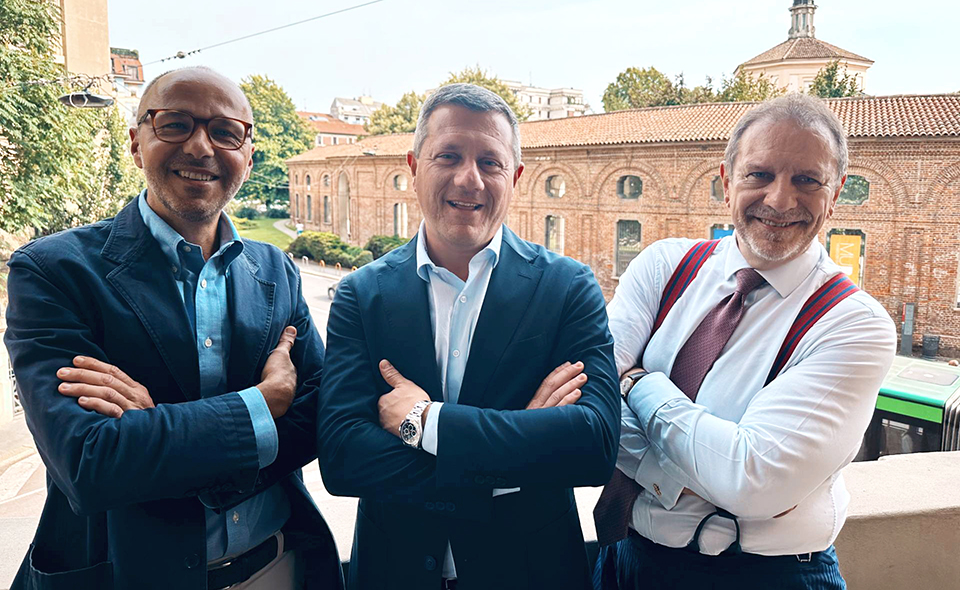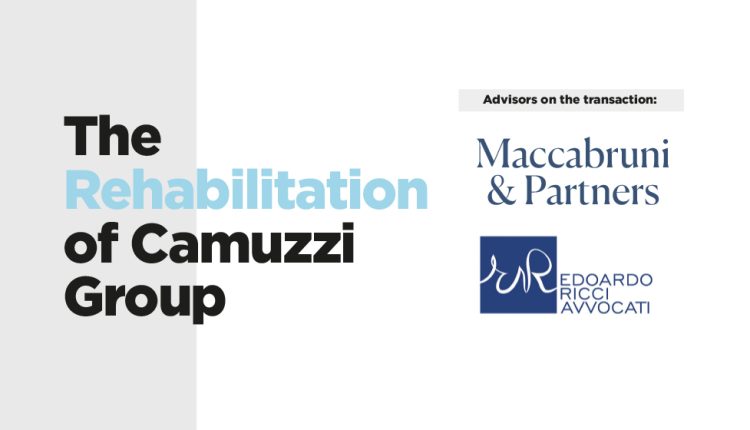The Rehabilitation of Camuzzi Group
Maccabruni & Partners and Edoardo Ricci Avvocati advised Camuzzi on the execution of its Italian restructuring plan, which was proposed by liquidators Stefano Barbiera and Claudio Calabi and accepted by a more than 90% majority of creditors, enabling the company to restructure more than €150 million of debt exposure.
Both law firms, with teams helmed by Franco Fabio Maccabruni and Gabriele Prenna, partner of Edoardo Ricci Avvocati, also assisted the company in the execution of its restructuring plan from 2017 to the end of May 2023.
The above-mentioned plan represented just the Italian part of the complex corporate reorganisation process managed by Chief Restructuring Officer Stefano Barbiera to restructure Camuzzi Group’s operations in Argentina, Luxembourg, the Netherlands and Italy over the last 10 years. Due to the completion of the worldwide restructuring and valorisation plan in Argentina, Camuzzi sold its stakes in the electricity segment (more than 2.5 million clients in Argentina) and was able to restructure more than €200 million of the debt exposure of its holding’s companies in Luxembourg and Netherlands.
The Italian restructuring plan was based on the valuation of Camuzzi’s real estate assets and the sale of its management buildings in Milan – located in front of the Scalo di Porta Romana, where the Milano Cortina 2026 Olympic Village will be built – to Bottega Veneta and Coima. The company’s bankruptcy agreement was thus concluded to creditors’ satisfaction for €85 million, owing to a more than €45 million increase in distributions compared to projections. All of these tasks, together with the main restructuring process, which included the agreements with the creditors of Camuzzi Nautica (Cantieri Navali Baglietto and Cantieri di Pisa) and the bankruptcy of Piacenza Football Club, were executed under the leadership of the CRO Stefano Barbiera, supported by Franco Maccabruni, historical legal advisors of Camuzzi Group worldwide, and Gabriele Prenna, who is also a historical lawyer of the Italian company.
Camuzzi, which has been active in the gas distribution sector since its founding in 1929, is currently the biggest natural gas distribution company in Argentina. The company’s business activity concerns the distribution of natural gas to more than 2 million clients (residential, commercial and industrial customers) through an extensive system of gas pipelines and networks (56.000km). Camuzzi will now also resume investing in Italy in the real estate sector that has become its core business. Its Italian investments will be made under the leadership of Fabrizio Garilli, who aided in its recapitalisation, as well as Stefano Barbiera as CEO.
An Interview with Stefano Barbiera, Franco Fabio Maccabruni and Gabriele Prenna:
Can you tell us more about the worldwide restructuring plan?
Stefano Barbiera: After the financial crisis of 2009, the yachting business of Camuzzi Group completely changed its fundamentals: the operating companies Cantieri Navali Baglietto and Cantieri di Pisa, with annual revenues of about €200 million, started to need bank credit lines for the same amounts in order to guarantee the completion and delivery of their luxury yachts, rather than exchanging a pledge on the vessel as was previously accepted as security for the buyers. In the middle of the negotiations with the banks, the Italian holding company declared bankruptcy. Consequently, Camuzzi Group began its worldwide restructuring and valorisation plan to restructure a debt of about €500 million.
Franco Maccabruni: I personally advised the global Group and the Italian company on the proceeding, which successfully culminated in the revocation of its bankruptcy by the Court of Appeal of Milan. Obviously, this occurred five years later when the restructuring plan was already in progress and part of the assets of the Group were already dismissed in order to pay the creditors.
Did you encounter any significant challenges during the course of your work? If so, how did you overcome them?
Stefano Barbiera: There were two important challenges in particular: the worldwide framework of the restructuring process that involved cross-border transactions between different countries, including Italy, Luxembourg, Switzerland, the Netherlands and Argentina, and the fact that I needed to move personally with my family to Argentina for five years to manage the most important part of the process.
Franco Maccabruni: The involvement of different countries in the process necessitated the management of different jurisdictions as well as different legal advisors of common and civil law.
Gabriele Prenna: I was not skilled, for example, in the bankruptcy law of Argentina, therefore it was very challenging to interact with Argentinean colleagues on such aspects.
What impact do you expect the successful execution of this plan will have on Camuzzi and the Italian market?
Stefano Barbiera: First of all, it means the possibility for Camuzzi Groupto start a new life with no debt, funds to be invested in Italian real estate transactions and its Argentinean business activities fully rehabilitated and performing in order explore a future quotation on the US stock market.
Franco Maccabruni: It shows that a bankruptcy agreement is a real and successful way to solve company crises, granting creditors significant satisfaction in terms of recovery and timing.
Gabriele Prenna: When a restructuring plan is well managed, it is also much easier to get the green light from the Tribunal and form the creditors. In a short time, we established not only that the agreement was accepted by a more than 90% majority of creditors, but also the consensus of the Court.
When a restructuring plan is well managed, it is also much easier to get the green light from the Tribunal and form the creditors.
Franco Maccabruni & Stefano Barbiera: It was very profitable for the company’s relationship with some executives of the Italian Tax Authority and Tax Collector, as well as the top restructuring management of Banca Popolare di Sondrio and ex-UBI Bank.
What about the corporate and tax issues of the transactions executed in the last 10 years?
Stefano Barbiera: Minimising the corporate chain and simplifying the structure was imperative for the worldwide restructuring process because profitability and efficiency became a priority. We had to execute various corporate cross-border transactions with legal and tax implications for the entire Group like, for example, a downstream cross-border legal merger where the Luxembourg holding company incorporated the controlling Dutch company. The merger was intended to rationalise the corporate structure and minimise the corporate chain of the Group. We also had to move different companies from Uruguay and Argentina to Europe, where the tax consequences had to be deeply analysed in order to avoid paying taxes in both countries.
Franco Maccabruni: A legal merger is a legal transaction between two or more legal entities in which assets and liabilities transfer under universal title from the acquired company to the acquiring company. To apply for the facilities provided under the EU rules for cross-border mergers, a list of specific requirements has to be satisfied and the merger should not predominantly be aimed at the avoidance or postponement of taxation.
Stefano Barbiera: Before executing these transactions, the assets and liabilities of the companies had to be valued at their economic value rather than their book value, which may result in a taxable gain. Therefore we had to go through various analyses and considerations in order to apply and qualify for the participation exemption rules.

About Maccabruni & Partners
Franco F. Maccabruni, the naming partner of Maccabruni & Partners, has thought commercial law, banking law and industrial law and published numerous scientific studies in these areas. Thanks to his academic experience and to a professional practice matured in a wide range of sectors, Franco and the Maccabruni & Partners team mainly deal with the structuring and negotiation of corporate transactions and commercial agreements, in addition to providing the necessary skills to enable effective and compliant managerial decisions and their correct implementation. The firm has also a litigation department and works mainly in European countries and Argentina.
About Edoardo Ricci Avvocati
Gabriele Prenna is equity partner of Edoardo Ricci Avvocati, a boutique law firm founded in 1996 by avv. prof. Edoardo Ricci (professor emeritus in Civil Procedure at the Law School of the Università degli Studi di Milano). The firm specialises in civil law, contracts and commercial and bankruptcy law, but also has departments dedicated to labour law, family law and torts. This high level of specialisation allows the firm to include among its clients listed companies, industrial groups, oil companies, firms operating in the financial and banking sectors and important private entities, as well as small and medium enterprises, alongside which it regularly operates.
About Stefano Barbiera
Stefano Barbiera is a top manager and business lawyer specialising in extraordinary corporate transactions and the management of company crises. Since 2012 he has supported and managed Camuzzi in a complex corporate reorganisation and restructuring process, becoming appointed as Chief Restructuring Officer and Executive Vice President with responsibility for the worldwide project. Stefano has overseen the restructuring of its operations in Italy, Luxembourg, the Netherlands and Argentina, where he moved for a number of years in order to better manage and coordinate this project.
Having successfully carried through the rescue of the entire group, Stefano has acted since 2017 as the liquidator of the Italian holding company Camuzzi SpA (currently acting as CEO) and as President of the holding Luxembourg company Camuzzi International, as well as Executive Vice President of the Camuzzi group’s Argentinian public utilities.




